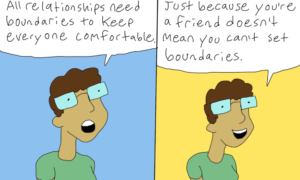Originally published on The Huffington Post and republished here with the author’s permission.
One in five Americans experience a mental health problem in any given year. Yet many people suffer with their symptoms in silence. The stigma that continues to surround mental health problems prevents individuals from getting the help they need.
It’s a common problem I’ve seen in my therapy office. People often waited years to seek help. Even though their symptoms were treatable, they were afraid to tell anyone about the symptoms they were experiencing.
Some of them feared a mental health diagnosis could affect their careers: Can I still teach if I have depression? If people know I have anxiety, will they assume my business is failing? Do I need to tell my boss I’m taking medication?
Others worried that they’d get labeled as “crazy.” Will other parents let their children come to my home if I go to counseling? If my neighbors see me in the waiting room, will they treat me different?
Many of them had legitimate concerns. Despite ongoing efforts to educate the public about mental health, many misconceptions remain.
Before the stigma can be stopped, these five mental health myths need to be debunked:
1. You’re Either Mentally Ill or Mentally Healthy
Similar to the way a physically healthy person may still experience minor health issues – like bad knees or high cholesterol – a mentally healthy person may experience an emotional problem or two.
Mental health is a continuum, and people may fall anywhere on the spectrum.
Even if you are doing well, there’s a good chance you aren’t 100% mentally healthy. In fact, the US Department of Health and Human Services estimates only about 17% of adults are in a state of optimal mental health.
2. Mental Illness Is a Sign of Weakness
As someone who trains people to build mental strength, I sometimes receive backlash from individuals who claim the phrase “mental strength” somehow stigmatizes mental illness.
Those comments come from people who automatically assume people with depression, anxiety, or other mental health conditions are “mentally weak.”
Mental strength is not the same as mental health.
Just like someone with diabetes could still be physically strong, someone with depression can still be mentally strong. Many people with mental health issues are incredibly mentally strong.
Anyone can make choices to build mental strength, regardless of whether they have a mental health issue.
3. You Can’t Prevent Mental Health Problems
You certainly can’t prevent all mental health problems – factors like genetics and traumatic life events certainly play a role. But everyone can take steps to improve their mental health and prevent further mental illness.
Establishing healthy habits – like eating a healthy diet, getting plenty of sleep, and participating in regular exercise – can also go a long way to improving how you feel. Similarly, getting rid of destructive mental habits, like engaging in self-pity or ruminating on the past, can also do wonders for your emotional well-being.
4. People with Mental Illness Are Violent
Unfortunately, when mental illness is mentioned in the media, it’s often in regards to a headline about a mass shooting or domestic violence incident.
Although many violent criminals are frequently portrayed as being mentally ill, most people with mental health problems aren’t actually violent.
The American Psychological Association reports that only 7.5% of crimes are directly related to symptoms of mental illness. Poverty, substance abuse, unemployment, and homelessness are among some of the other reasons why people commit violent acts.
5. Mental Health Problems Are Forever
Not all mental health problems are curable. Schizophrenia, for example, doesn’t go away. But most mental health problems are treatable.
The National Alliance on Mental Illness reports between 70 and 90% of individuals experience symptom relief with a combination of therapy and medication.
Complete recovery from a variety of mental health issues is often possible.
Getting Rid of the Mental Health Stigma
Even though suicide is the tenth leading cause of death in America, most public service announcements and government education programs focus solely on physical health issues, like cancer.
Raising awareness of mental health issues and debunking the common misconceptions could be instrumental in saving lives.
Amy Morin a psychotherapist, keynote speaker, and the author of 13 Things Mentally Strong People Don’t Do, a bestselling book that is being translated into more than 20 languages.
***
If you or someone you know needs help, please call 1-800-273-8255 for the National Suicide Prevention Lifeline. If you are outside of the US, please visit the International Association for Suicide Prevention for a database of international resources.
[do_widget id=’text-101′]
Amy Morin is a licensed clinical social worker, psychotherapist and college psychology instructor. She’s an internationally recognized expert on mental strength and she’s the author of 13 Things Mentally Strong People Don’t Do. She’s also a Forbes contributor and she serves as About.com’s Parenting Teens Expert and Discipline Expert. You can check her out on Twitter @AmyMorinLCSW.
Search our 3000+ articles!
Read our articles about:
Our online racial justice training
Used by hundreds of universities, non-profits, and businesses.
Click to learn more





















